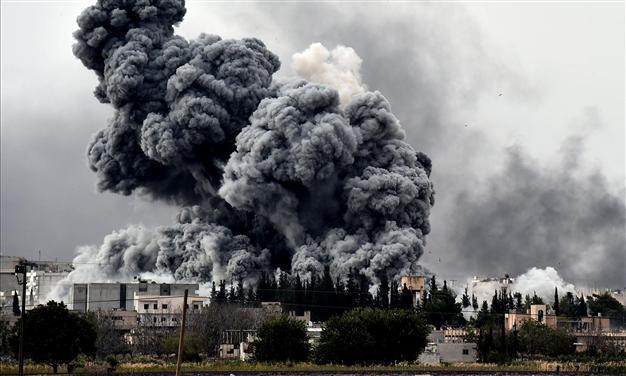ISIL pours in reinforcements to Syria's Kobane: Monitor
MÜRŞİTPINAR - Agence France-Presse

Smoke rises after a strike on Kobane on Oct. 12. AFP Photo / Aris Messinis
The Islamic State in Iraq and the Levant (ISIL) poured in reinforcements Oct. 12 for its nearly month-long siege of Kobane as the Syrian town's Kurdish defenders kept up their high-profile resistance.ISIL has sustained serious losses in the battle for the town despite their superior armour, with at least 36 of its fighters killed on Oct. 11 alone, the Syrian Observatory for Human Rights reported.
With the world's press massed just across the nearby border with Turkey, the fight for the town has become one the jihadists cannot afford to lose, the Britain-based monitoring group said.
"It's a decisive battle for them," Observatory director Rami Abdel Rahman told AFP. "If they don't pull it off, it will damage their image among jihadists around the world."
Abdel Rahman said that ISIL was sending additional fighters from other areas it controls in Syria, including its Euphrates Valley stronghold of Raqqa, after its Oct. 10 capture of the Kurdish command headquarters in Kobane failed to deliver a decisive blow.
"They are sending fighters without much combat experience," said Abdel Rahman, whose group has a wide network of sources inside Syria.
"They are attacking on multiple fronts but they keep being repulsed, then countering and being pushed back again."
Meanwhile, Kurdish fighters halted a thrust by ISIL militants towards the heart of the town of Kobane Oct. 12 before dawn.
The pre-dawn attack came after the ISIL militants captured the defenders' headquarters Oct. 10, sparking fears they would cut off the last escape route to neighbouring Turkey.
The renewed ISIL drive in Kobane sparked 90 minutes of heavy fighting before the jihadists fell back.
U.S.-led coalition warplanes launched two air strikes against ISIL targets south and east of town early Oct. 11, said the group, which has a wide network of sources inside Syria.
The Observatory said a sandstorm later prevented more air raids, while fighting raged in southern Kobane and near the captured headquarters.
The coalition has intensified air strikes against ISIL, which began its assault on September 16, but the Pentagon says there are limits to what can be done without ground troops.
Small groups of Kurdish fighters were trying to harry the encircling jihadists with operations across the front line.
U.N. envoy for Syria Staffan de Mistura warned Oct. 10 that 12,000 or so civilians still in or near Kobane, including about 700 mainly elderly people in the town centre, "will most likely be massacred" if the town falls.
Kobane was "literally surrounded" except for one narrow entry and exit point to the Turkish border, de Mistura said, urging Ankara to allow volunteers and equipment in to help defend the town.
The Observatory said at least 554 people have been killed in and around Kobane since the ISIL advance began - 298 ISIL militants, 236 Kurdish fighters and 20 civilians.
Turkey has tightened security of its porous border after the fighting in Kobane sparked the exodus of 200,000 refugees over the frontier.
Turkey has been deeply reluctant to allow weapons or Kurdish fighters to cross the border despite repeated nights of protests among its own large Kurdish minority that have left more than 30 people dead.
Meanwhile, U.S. officials warned that while attention is focused on Kobane, the jihadists have been piling on pressure in Iraq.
U.S. military planes dropped ammunition, food and water Oct. 10 and Oct. 11 to Iraqi troops under pressure from ISIL in north Iraq, the U.S. Central Command said.
The move marked the first time that coalition aircraft airdropped supplies to Iraqi government forces. Similar drops were previously part of humanitarian missions for civilians, such as Yazidis and Turkmen.
British soldiers are in Iraq training the Kurdish peshmerga forces battling ISIL, the Ministry of Defence in London said Oct. 11.
A "small, specialist team" is operating in Arbil, the capital of Iraq's autonomous Kurdistan region, training peshmerga how to use the heavy machine guns Britain supplied in September.
Military chiefs from the 21 countries already committed to the coalition are to meet in Washington this week to discuss strategy, Pentagon officials said.
U.S. defence officials insist the primary focus of the campaign remains Iraq, where there are capable local forces on the ground to work with, particularly Kurds in the north.
Some of Anbar province fell to ISIL at the start of the year and most of the rest was seized by the Sunni extremists in a lightning sweep through Iraq's Sunni Arab heartland in June. "I think it's fragile there now," one senior U.S. defence official told AFP.
"They are being resupplied and they're holding their own, but it's tough and challenging."
















